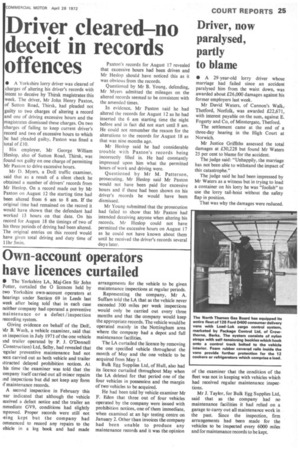Driver cleared—no deceit in records offences
Page 27

If you've noticed an error in this article please click here to report it so we can fix it.
• A Yorkshire lorry driver was cleared of charges of altering his driver's records with intent to deceive by Thirsk magistrates this week. The driver, Mr John Henry Paxton, of Sutton Road, Thirsk, had pleaded not guilty to two charges of altering a record and one of driving excessive hours and the magistrates dismissed these charges. On two charges of failing to keep current driver's record and two of excessive hours to which he had pleaded guilty, Paxton was fined a total of /10.
His employer, Mr George William Heslop, also of Sutton Road, Thirsk, was found not guilty on one charge of permitting Mr Paxton to drive excessive hours.
Mr D. Myers, a DoE traffic examiner, said that as a result of a silent check he obtained a number of drivers' records from Mr Heslop. On a record made out by Mr Paxton on August 12 the starting time had been altered from 6 am to 8 am. If the original time had remained on the record it would have shown that the defendant had worked 13 hours on that date. On his record for August 18 the timings of two of his three periods of driving had been altered. The original entries on this record would have given total driving and duty time of 1 1 h r 5min. Paxton's records for August 17 revealed that excessive hours had been driven and Mr Heslop should have noticed this as it was obvious from the records.
Questioned by Mr B. Young, defending, Mr Myers admitted the mileages on the altered records seemed to be consistent with the amended times.
In evidence, Mr Paxton said he had altered the records for August 12 as he had inserted the 6 am starting time the night before and in fact did not start until 8 am. He could not remember the reason for the alterations to the records for August 18 as that was nine months ago.
Mr Heslop said he had considerable trouble with Paxton's records being incorrectly filled in He had constantly impressed upon him what the permitted hours of work and driving were.
Questioned by Mr M. Patterson, prosecuting. Mr Heslop said Mr Paxton would not have been paid for excessive hours and if these had been shown on his driver's records he would have been dismissed.
Mr Young submitted that the prosecution had failed to show that Mr Paxton had intended deceiving anyone when altering his records. Mr Heslop could not have permitted the excessive hours on August 17 as he could not have known about them until he received the driver's records several days later.








































































































